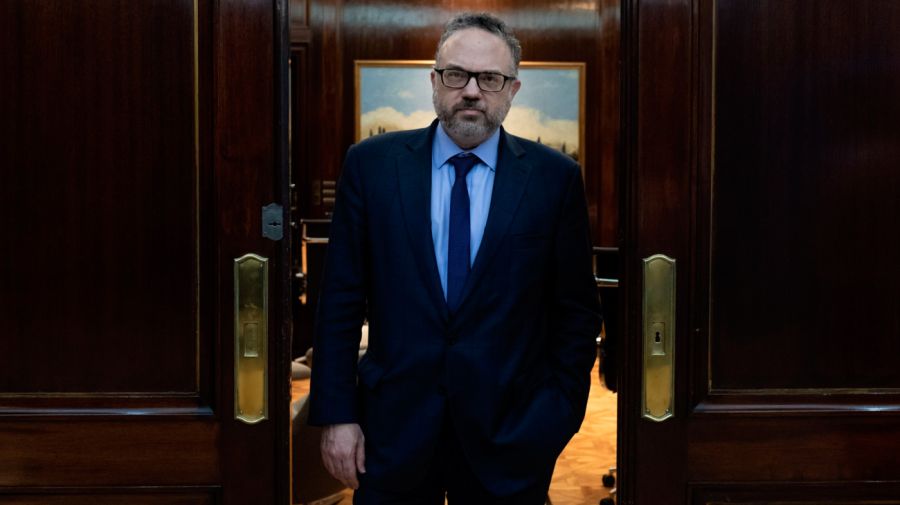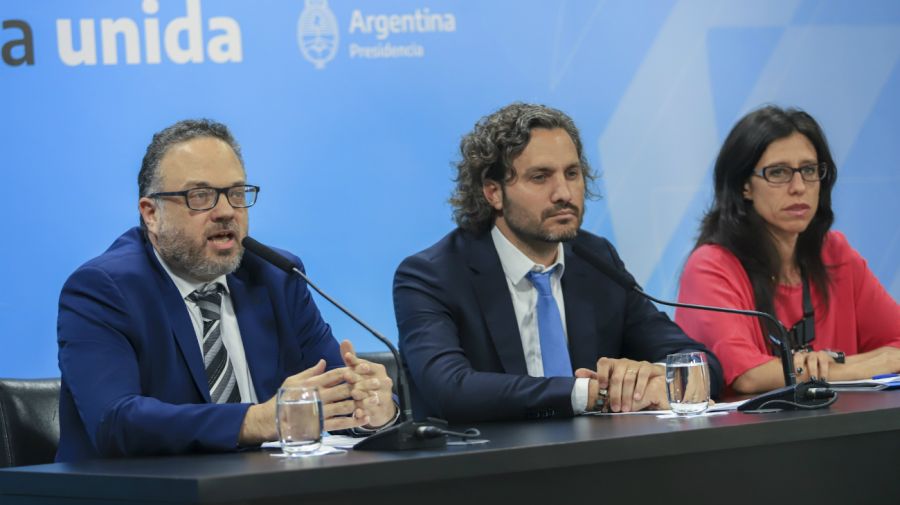With his moderate and academic discourse, Productive Development Minister Matías Kulfas explains that government strategy consists of transforming into productive investment much of the 72 percent of GDP deposited in accounts outside the financial system.
For that Kulfas says he has a plan, although he does not need a PowerPoint display to present it to society. He says that internal debates about administration should be seen more as a virtue than as a defect.
In this same series recently, Buenos Aires Province Cabinet Chief Carlos Bianco named Germany as one of his productive models. What is the development model of this fourth Kirchnerite presidency?
Rather than the fourth Kirchnerite presidency, this is a Frente de Todos government containing all the expressions of Peronism and allied forces, including Kirchnerism. But I see it as something broader. There are many countries from which one could take some particular references. We look at the Scandinavian countries, above all because they are richly endowed with natural resources, as is Argentina although less so. When you analyse the structural situation of Argentina, it has every potential to develop its mining, energy, agro-industry and other productive sectors. How do we achieve a social organisation which adds value to all that? Scandinavian countries have as a reference having accomplished very positive things with an interesting social outlook.
I agree with Bianco as to Germany and there is plenty to learn from the Asian economies. No country can be extrapolated to Argentina. The countries of which we can speak may serve us as inspiration for some point in particular. The solutions must arise out of Argentine characteristics.
In an interview in this series, Daniel Artana said that until recently economists were divided between the orthodox and heterodox but these days they are all united in dissent with the Instituto Patria. How is your co-existence with Kirchnerite economic thinking?
There is a bit of a myth about the arguments with Instituto Patria. There is pluralistic thinking among the forces making up Frente de Todos. At other times this would have been valued as something enriching but now we are criticised for our discussions, which are in public – there are no big secrets. Not all the economic thinking linked to Cristina [Fernández de] Kirchner comes from Instituto Patria. Those of us with administrative responsibilities also debate fiercely within the Economic Cabinet and this gives structure to economic policy. We meet every Wednesday religiously in order to define programmes and measures.
Pablo Gerchunoff has said that his book “¿Por qué la Argentina no fue Australia? (Why wasn’t Argentina Australia?)” should have been entitled “¿Por qué la Argentina no fue Argentina?” as a metaphor of the distance between expectations and achievement. Why hasn’t Argentina been that country?
Due to various factors, starting with instability. There was political instability. We’ve undergone coups d’états, interrupted plans and a pendular economy, as mentioned by Marcelo Diamand, another economist who has made a contribution. That was decisive. Linked to that political instability were the difficulties in structuring a stable growth path. That is achieved by consensus or hegemony, of which Argentina had neither. The only consensus is democracy. From 1983 onward, none of the problems we had, which were many, implied renouncing democracy. There were always elections with the winners of the vote governing and the losers correspondingly making the best of it.
Will the transformation be achieved by consensus or hegemony?
We have to do it via consensus. In this highly polarised scenario known as la grieta with growing extremes, I see the consolidation of hegemonies as difficult although there are countries which develop on that basis.
Do you see consensus as more possible today than five, 10 or 15 years ago?
Yes. My optimism is sustained by the social protagonists. Cheap tricks and polarisation continue to dominate in the political class. It is in the trade unions and the productive sectors where I see a fabric for consensus.
It is often said that you and Martín Guzmán have more points of contact with opposition economists than with some linked to the government. Are there moments in which you feel closer to them?
Not those who actively work in the opposition, no, I find very few points of contact. But I do have some with economists who are not active in the opposition but who clearly neither vote for nor sympathise with Frente de Todos. You recently mentioned Pablo Gerchunoff. He seems like an interesting person to me. I had a WhatsApp recently over his latest book. I disagree over many things but others seem to me to provide an interesting focus.
Would you say, for example, that the differences between Hernán Lacunza and Nicolás Dujovne place you closer to Lacunza and Guzmán closer to Dujovne?
I don’t know about that. I have a high opinion of Hernán Lacunza. He seems like a good person to me and he faced a really tough moment when he was Economy minister. But I’m not clear what the real differences are.
When will there be an agreement with the IMF and how will it affect the real economy?
The “When” is in Martín’s head, he’s the one negotiating and the one with the right answer. As to the effects, they need a balanced outlook. Neither will all Argentina’s problems be resolved nor credibility gained but nor should it be underestimated. It will be important, giving certainty for the next few years, above all referring to debt deadlines, the projected structure for capital redemption, interest payments and the needs for hard currency in the next few years, thus clearing up a significant problem.
Afterwards, it’s up to us. If we can continue on a path of recovering productive activity, achieving a good rebound from the pandemic in the worst-hit sectors, like tourism and the domestic market, it will permit us to move ahead with a scenario of internal revival. That’s where the policies of transformation kick in – green industrialisation, sustainable mobility, everything to do with developing new industrial sectors, digitalisation, the knowledge economy, the agenda we propose despite the pandemic. We won’t remain stuck in the cycle, we have an agenda for this entire decade.
About inflation you said: “The worst moment was March. While still at important levels, it’s been coming down with a perspective of converging down to a monthly two percent.” The Economist has an article on rising inflation in England and the increased price of food commodities. Obviously there’s an issue there. How long will it take to bring inflation down from three to two percent and then from two to one percent?
From three to two, very soon. We’ve been on a downward slope since the March peak and during the next few months monthly inflation will be two points. From two to one is an important change which requires as preconditions macroeconomic stabilisation and the conclusion of debt agreements for a more predictable scenario at the macroeconomic level.
Just like Guzmán, I think that inflation is a multi-causal problem. There is no single explanation in the case of Argentina. That is why, apart from a correct fiscal policy, you need wage and price convergence and agreements with the productive sectors. The social dialogue proposed by the president is an important path.

In an interview last year you said: “Convertibility took the country out of hyperinflation, which was no mean achievement, but after a time they shouldn’t have continued with the same formula which smothered part of the country’s production. Tools need to be modified according to the circumstances. This is a problem which also has to do with consensus.” In this same series of interviews, Domingo Cavallo said that he thinks that a similar strategy will be unavoidable in 2023 to resolve the problem behind inflation, Argentina’s twin currencies. Will a shock plan become necessary?
Shock policies are very cruel with very harsh effects in the short term without always producing results because their social consequences are so grave that the reaction prevents them from continuing, something which many technocratic economists fail to consider. Nor do they work in every circumstance.
One thing is the economy facing Domingo Cavallo after the two hyperinflations of 1989 and 1990 with prices shooting up 100 percent monthly, and making a sharp cut in one stage. But economies with intermediate inflation like Argentina, or Chile or Colombia beforehand, is another thing because it took them a long time to bring it down, not with shock policies but gradualism and they did it with growth.
Argentina has the possibility to bring down inflation, which it needs to do to grow. An inflation rate like now is a problem, nobody argues with that. To move to lower inflation you need multi-sector agreements and clear objectives, not a “wait and see” gradualism but agreements with productive and trade union sectors. That is what we have proposed from the start but the pandemic was so disruptive that it displaced our agenda.
Can Argentine society endure 15 years to reach single-digit inflation?
In Chile or Colombia that reduction took almost eight years, moving from over 30 percent annually to single-digit levels.
One issue seldom mentioned is the lack of competition, the cartels with few companies supplying products. Along general lines in Argentina 80-90 percent of the supply of any item is concentrated into two or three firms. How do you resolve some multinationals leaving Argentina so that there are less companies supplying the same kind of product?
Some markets are concentrated but I don’t believe the cause of inflation lies there. Of course, when the sparks fly, the existence of oligopolistic markets makes some sectors mark up faster.
Among the many causes of inflation, which is the biggest?
The main problem is the external constraint, the lack of hard currency and the difficulties in generating capital markets in local currency. This is an issue which has already been running for several decades – it’s a structural problem. That 72 percent of Argentine GDP invested in financial assets outside the country or formal circuits.
Would the leading cause be that every now and then we have a devaluation leading to inflation?
The big price leaps come with devaluations. There are not always problems of distributive tussles, mainly when the economy is closer to full employment. To speak of a distributive tussle these days or of wage-push inflation seems out of line to me, the more so when the profitability of some sectors is a bit tighter. There is some margin to increase wages without any inflationary effect, it’s also a question of calibration. In our profession it’s become a cliché to say whether printing money is inflationary or not but it has nothing to do with it, depending on the moment. It’s not correct to think that any time the Central Bank prints money to finance the Treasury, it is inflationary.
In the long run it is.
That depends. There is economic policy and there is monetary policy. At the other extreme, thinking that the Central Bank can finance the Treasury indefinitely – that does seem crazy to me.
So to have a sustainable plan in inflationary terms, is resolving the external constraints what is needed?
Argentina needs that imperiously, implying many things.

Your economic vision has a moderation which in any other country would be no different from somebody in the economic establishment (and when I say “establishment,” I don’t mean it pejoratively). Why is there this perspective that your government is so anti-market and so anti-capitalist?
In Argentina, or in the world, there are extreme views with one saying: “The market resolves everything” and the other saying: “The state resolves everything.” It’s neither one thing nor the other. When the market was left to resolve everything, we ended up as we did – with excess debt, crisis, people losing out and problems of unemployment. When the state wants to resolve everything, you end up draining much of the talent and capacity of the private sector.
That sounds like social democracy, German style. Germany grew on the premise of as much market as possible and as much state as necessary. It has an image of a pro-capitalist country, I’d say orthodox in economic terms. Yet Argentina’s image is having a government far removed from that position of balance and moderation.
We’ve discussed that and are trying to structure that consensus. We believe in a highly active state.
So is your aim a volume of state no greater than the German?
It depends on the moment. If the German state intervenes to rescue Lufthansa, a private company, nobody sees that as problematic. When we said that there was a problem with Vicentin, a very complicated situation blew up. We recently participated in a very positive salvage operation for Impsa, the old Pescarmona company, unique in Latin America. It was very close to shutting down, thus losing its unique technology for Latin America. We implemented a job scheme, incorporating the provincial government of Mendoza, where this company is based, and yet we still found some signs of resistance. There are prejudices in both extremes. I wish that what I believe were establishment thinking but I see that as very much more inclined to liberal ideas of an Argentina where the market resolves everything. We haven’t done well going down that path.
Do Argentine businessmen take the view that the state should not intervene in anything?
Many do, although I don’t like to generalise. On a positive note, I listened to Toyota CEO Daniel Herrero a while ago, a very interesting person. We worked a lot on the plan for the auto industry. We asked him how a productive export project could be developed with a high content in national auto parts. His answer was: “We did what we had to do, we sought sustainability.” Businessmen need to think of society. To add value to that 72 percent of national savings outside Argentina, the time will come when everyone will have to contribute. I say that as an invitation to build consensus.
Wouldn’t some self-criticism help in order to construct that consensus? Hardline Kirchnerism has proposed using the special drawing rights to pay off debt or the idea of nationalising private medicine, questions launched in speeches which convey a wrong impression as to the degree of intervention in the economy.
Sometimes these things may be invitations to discussion and public debate, a way of placing problems on the table but they are picked up by some people as definitions of economic policy. You have given examples precisely of questions which were not implemented as policies. Deepening democracy also means being a little less afraid of the necessary debates.
Any self-criticism, anything which needs correcting, independently of the pandemic, when almost halfway through this presidential term?
We ran into a very difficult situation. If we had to do it all over again, there are surely things we would have done differently but I find many more things to highlight than to enter into self-criticism. Above all, we’ve been great pilots of the storm, sustaining activity and employment. Today in this Argentina of the pandemic, there are several productive sectors producing more than in 2019. That is no mean feat. And at the same time we have launched new agendas: green industrialisation, 4.0. industry, lithium, medicinal cannabis and a reform agenda which will change the face of the Argentine economy.
“The government has no friends in the business world”
Are business assets changing hands, first from foreign to local players and then from the latter to people closer to government ideology?
I reject that entirely, the truth is no. Changes of hands are customary in the Argentine economy as in many others in the world. It cannot be said that any of these movements has anything to do with anything the government is pushing. This government has no friends in the business world but has dialogue with all sectors. We might have more conceptual affinity with some than with others but there are no friends in the sense you say.
Is it good or bad that foreign companies are leaving and being substituted by national capital?
In that sense I have no kind of dogma or prejudice. It is neither good nor bad. I’m interested in seeing productive projects, what their aims are and that they incorporate jobs, technology and innovation. Whether that is done by a local or foreign company is secondary. A false debate has been installed as to whether there is an exodus of companies and disinvestment. That’s not true. Investment in the first quarter of this year increased 14 percent against 2019. Since the Alberto Fernández government began, there have been over 900 announcements of investment, many implemented, to the tune of US$34 billion, of which just under half comes from foreign companies while the rest is local firms of all sizes. We have a very strong policy of backing the investments of PyMES (small and medium-sized companies) but we also celebrate investment in general terms. We do see changes of hands which have to do with international strategies. Walmart made the decision to withdraw from Brazil, Britain and Argentina. That was no exodus. It was purchased by another businessman, Francisco de Narváez, somebody who knows the sector.




























Comments